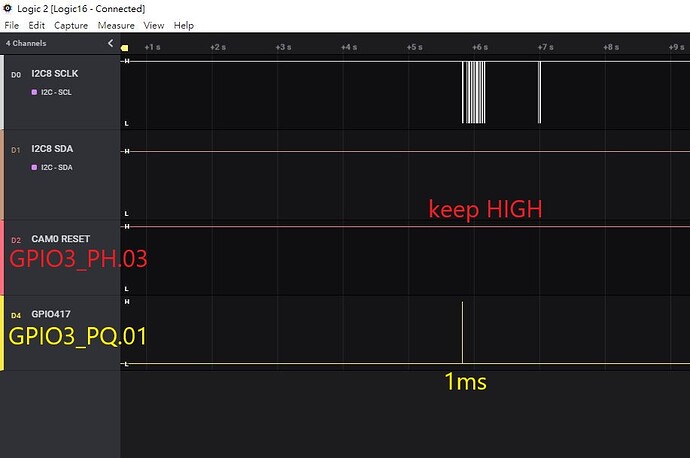I add the lt6911uxc driver to I2C-8 in device tree.GPIO
[ \hardware\nvidia\platform\t19x\galen\kernel-dts\tegra194-p2888-0001-p2822-0000.dts ]
#include "common/tegra194-p2888-0001-p2822-0000-common.dtsi"
#include "common/tegra194-p2822-camera-modules.dtsi"
#include "t19x-common-modules/tegra194-camera-plugin-manager.dtsi"
#include "common/tegra194-p2822-0000-hdmi2mipi-lt6911uxc-a00.dtsi" // add FPGA driver
[ common/tegra194-p2822-0000-hdmi2mipi-lt6911uxc-a00.dtsi ]
#define LT6911_EN "okay"
/ {
/* set lt6911uxc reset and interrupt gpio direction */
gpio@2200000 {
camera-control-output-low {
status = LT6911_EN;
gpio-hog;
output-low;
gpios = <TEGRA194_MAIN_GPIO(H, 3) 0>;
label = "cam0-rst";
};
camera-control-input {
status = LT6911_EN;
gpio-hog;
input;
gpios = <TEGRA194_MAIN_GPIO(P, 0) 0>;
label = "cam0-int";
};
};
/* i2c-8 */
i2c@31e0000 {
clock-frequency = <100000>;
lt6911uxc_a@2b {
compatible = "lontium,lt6911uxc";
reg = <0x2b>;
status = LT6911_EN;
devnode = "video0";
/* Reset */
reset-gpio = <&tegra_main_gpio TEGRA194_MAIN_GPIO(H, 3) GPIO_ACTIVE_HIGH>;
/* Interrupt */
interrupt-parent = <&tegra_main_gpio>;
interrupts = <TEGRA194_MAIN_GPIO(P, 0) IRQ_TYPE_LEVEL_HIGH>;
port@0 {
ret = <0>;
status = LT6911_EN;
hdmi2csi_lt6911_out0:
endpoint {
status = LT6911_EN;
port-index = <0>;
bus-width = <4>;
remote-endpoint = <&hdmi2csi_csi_in0>;
};
};
};
};
}
I pull cam0-rst(pin L5, GPIO3_PH.03) to HIGH in lt6911uxc_probe, and read lt6911uxc chip id by I2C-8.
[ \kernel\nvidia\drivers\media\i2c\lt6911uxc.c ]
static int lt6911uxc_probe(struct i2c_client *client, const struct i2c_device_id *id)
{
struct lt6911uxc_state *state;
struct v4l2_subdev *sd;
int err = 0;
dev_info(&client->dev, "Probing lt6911uxc\n");
state = devm_kzalloc(&client->dev, sizeof(struct lt6911uxc_state), GFP_KERNEL);
if (!state)
return -ENOMEM;
state->pdata = lt6911uxc_parse_dt(client);
if (!state->pdata)
return -ENODEV;
state->i2c_client = client;
sd = &state->sd;
v4l2_i2c_subdev_init(sd, client, <6911uxc_ops);
dev_info(&client->dev, "Chip found @ 7h%02X (%s)\n", client->addr, client->adapter->name);
// Release CAM_RST Reset (pin L5, GPIO3_PH.03)
dev_info(&client->dev, "Releasing CAM_RST Reset (gpio 0x%04X)\n", state->pdata->reset_gpio);
if (!gpio_is_valid(state->pdata->reset_gpio))
{
dev_err(&client->dev, "Reset CAM_RST GPIO is invalid!\n");
return state->pdata->reset_gpio;
}
err = devm_gpio_request_one(&client->dev, state->pdata->reset_gpio, GPIOF_OUT_INIT_HIGH, "lt6911uxc-reset");
if (err)
{
dev_err(&client->dev, "Failed to request Reset CAM_RST GPIO 0x%04X: %d\n",
state->pdata->reset_gpio, err);
return err;
}
// CAM0_RST Reset (pin L5, GPIO3_PH.03)
gpio_set_value(state->pdata->reset_gpio, 0);
usleep_range(30, 50);
dev_info(&client->dev, "CAM0_RST Reset (gpio 0x%04X) to low\n", state->pdata->reset_gpio);
gpio_set_value(state->pdata->reset_gpio, 1);
usleep_range(30, 50);
dev_info(&client->dev, "CAM0_RST Reset (gpio 0x%04X) to high\n", state->pdata->reset_gpio);
/* read CHIP ID */
lt6911uxc_read_chipid(sd);
/* initial setup */
lt6911uxc_initial_setup(state);
return 0;
err_ctrl_handler:
v4l2_ctrl_handler_free(&state->ctrl_handler);
return err;
}
static struct lt6911uxc_platform_data* lt6911uxc_parse_dt(struct i2c_client *client)
{
struct device_node *node = client->dev.of_node;
struct lt6911uxc_platform_data *pdata;
const struct of_device_id *match;
int gpio;
dev_dbg(&client->dev, "%s \n", __func__);
match = of_match_device(lt6911uxc_of_match, &client->dev);
if (!match)
{
dev_err(&client->dev,
"Driver has not been loaded from an of_match\n");
return NULL;
}
pdata = devm_kzalloc(&client->dev,sizeof(struct lt6911uxc_platform_data), GFP_KERNEL);
gpio = of_get_named_gpio(node, "reset-gpio", 0);
if(gpio < 0)
{
if(gpio == -EPROBE_DEFER)
{
dev_err(&client->dev, "reset-gpio read failed: (%d)\n", gpio);
goto prop_err;
}
dev_info(&client->dev, "reset-gpio not found, ignoring\n");
}
pdata->reset_gpio = gpio;
return pdata;
prop_err:
dev_err(&client->dev, "Could not parse DT parameters\n");
devm_kfree(&client->dev, pdata);
return NULL;
}
I see the cam0-rst(pin L5, GPIO3_PH.03) keep to LOW in lt6911uxc_probe(), but I had set the GPIO3_PH.03 to HIGH and it seem doesn’t work, so it wil get i2c8 read fail.
gpio_set_value(state->pdata->reset_gpio, 1);
How to check the other driver hold CAM0-RESET(GPIO3_PH.03) to LOW?
Why I can not pull CAM0-RESET(GPIO3_PH.03) to HIGH in my lt6911uxc_probe()?




